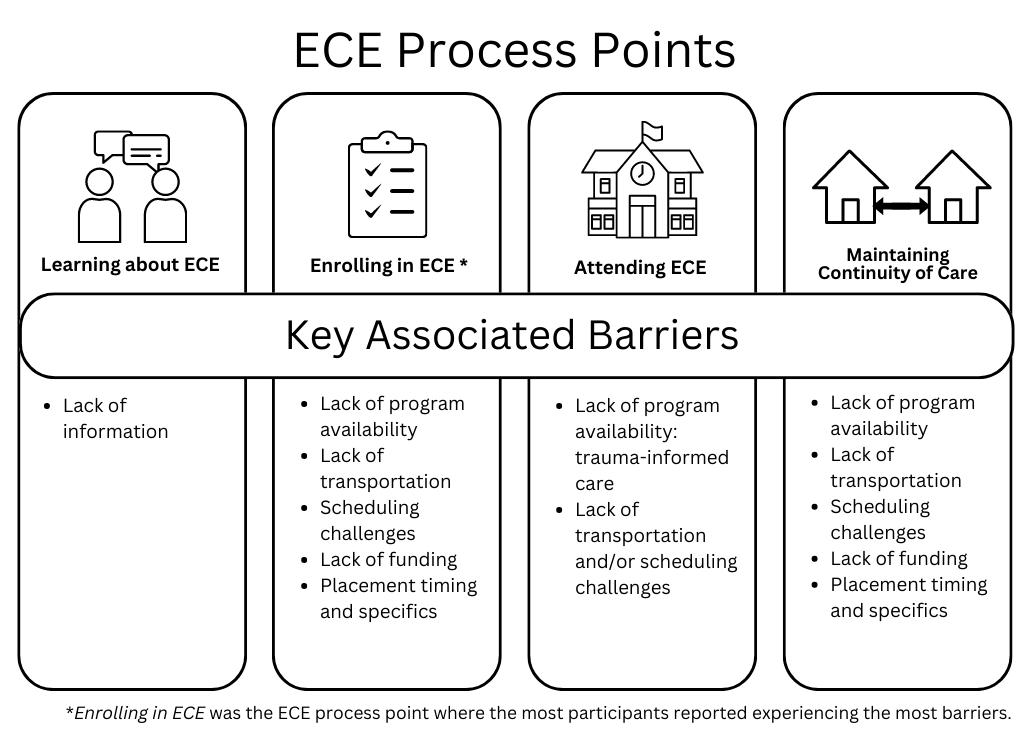Early care and education (ECE) programs–like child care, private and public preschool, Head Start, early childhood special education (ECSE), and Early Childhood Family Education (ECFE)–offer a lot of benefits to young children. Research suggests ECE programs boost children’s and their families’ health and wellbeing over their lifetimes. These programs are even thought to contribute to better parenting practices. And of course, ECE helps young children get ready for kindergarten, setting them up for success academically and socially.
The Minnesota legislature was interested in knowing more about how many children in foster care in Minnesota participate in ECE programs. They also wanted to find out what the possible barriers to participation might be and how to address them. The Minnesota Department of Human Services, on behalf of the legislature, commissioned a study with the Center for Advanced Studies in Child Welfare (CASCW) and its partner, CEED, to answer these questions.
Researchers from CASCW and CEED accessed public data from 2019 to learn about children in foster care and their enrollment in ECE programs. They released an initial report describing their findings, including the fact that less than half (43.7%) of young children in foster care participated in ECE in 2019. That figure is similar to the percentage of the general child population in Minnesota who participated (44.1%). Yet it is arguably very important for children in foster care to access ECE. Studies have found that children in foster care are more likely to face challenges both in school and in their lives outside of school. ECE programs could help children in foster care build a foundation to overcome those challenges.
Barriers to participation
A new report, Early Care and Education Participation for Young Children in Foster Care: Family and Staff Perspectives, builds on the researchers’ earlier work. To compile this report, they spoke directly with Minnesota families, ECE staff members, and child welfare professionals about their experiences. They conducted 37 focus groups and interviews with 69 individuals across the state.
The researchers learned that barriers to ECE participation could pop up anywhere in the process of finding, enrolling in, and attending an ECE program.

Families said that simply finding a suitable ECE program to access was the hardest part. There were too few programs with too few openings for children. There were logistical problems with work hours, program schedules, and transportation. Also, too few high-quality programs accepted Early Learning Scholarships–a type of financial assistance that helps families afford ECE.
Many families said child welfare workers and ECE staff members were a big help in getting children enrolled in programs, but that wasn’t the case across the state. Some families leaned instead on foster family support groups and personal networks for information and support in finding ECE programs.
Opportunities for improvement
In speaking with study participants, the research team found that foster and biological family members, ECE educators, and child welfare workers all felt that ECE was important both to children and their families. Interviewees offered ideas for lowering barriers that agreed with the researchers’ recommendations–ideas like better information-sharing and statewide guidance for child welfare workers on assisting families with signing up for ECE. The report also recommends that the state invest in ECE programs themselves.
“The greatest barrier to ECE participation may also be the most difficult one to fix: program capacity,” says Ann Bailey, PhD, director of CEED and one of the researchers involved in the project. “Our conversations with families and educators painted a vivid picture of the ongoing shortage of high-quality early childhood programming, especially in rural areas of the state. However, we can also do a better job of helping families get connected with existing ECE programs. The easier we make it to get children in foster care enrolled in ECE, the better for everyone.”



